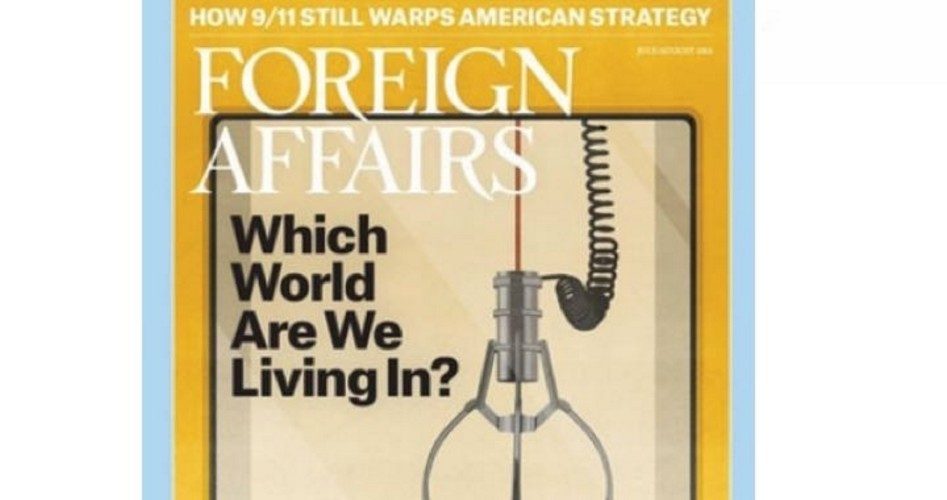
The mission statement found in Foreign Affairs magazine asserts that it will “tolerate wide differences of opinion,” and that its articles “will not represent any consensus of belief.”
On the contrary, one can read Foreign Affairs on a regular basis and never see any articles expressing concern about the negative effects of open borders and multilateral trade agreements upon our national sovereignty. In fact, what one gets from the magazine is a steady diet of globalism — and in the last two years, a drumbeat of anti-Trump rhetoric.
The May/June 2019 edition of the bimonthly publication gives every indication that globalism and anti-Trump views will continue to be a staple. A cursory look at the article titles demonstrates this assertion. Daniel Drezner wrote, “This Time Is Different: Why U.S. Foreign Policy Will Never Recover.” Mira Rapp-Hooper and Rebecca Friedman Lissner teamed up to pen, “The Open World: What America Can Achieve After Trump.” Finally, Kori Schake authored, “Back to Basics: How to Make Right What Trump Gets Wrong.”
Detect a pattern?
Lest one think that all the writers are just partisan Democrats, Schake was a protégé of the National Security Advisor to Republican President George W. Bush, Condoleezza Rice, who is a member of the Council on Foreign Relations, which publishes Foreign Affairs. The publication is quite nonpartisan, just so long as one sympathizes with its globalist agenda. In other words, one can be a Republican globalist and write for Foreign Affairs, or one can be a Democrat globalist, just so long as one is a globalist.
In her article, Schake charges, “Trump is a powerful critic of existing practices but lacks the competence to deliver better outcomes.” She laments, “Trump uses multilateral summits to insist that sovereignty matters more than agreed rules and practices, rebukes trade and security arrangements as unfair, and considers allies a burden rather than an advantage.”
While Schake is somewhat optimistic that the globalist order will triumphantly reemerge after Trump leaves office, Daniel Drezner, a professor of International Politics and a regular contributor to the Washington Post, takes a more pessimistic view, arguing that U.S. foreign policy “will never recover” from Trump. Drezner argues that when more internationalist-minded presidents were in the Oval Office, it was a good thing that presidents exercised nearly-exclusive power in foreign policy.
“Foreign policy analysts largely celebrated this concentration of power in the executive branch, and prior to Trump, their logic seemed solid,” Drezner wrote. But Drezner added, “What they failed to plan for was the election of a president who displays the emotional and intellectual maturity of a toddler,” and, as president, “he [Trump] has governed mostly by tantrum,” and is operating “in a land of make-believe.” This is what passes for a scholarly publication.
These insults of Trump are typical in Foreign Affairs. In addition to generic name-calling, Drezner makes some specific criticisms of Trump. “After Trump, a new president will no doubt try to restore sanity to U.S. foreign policy. Surely, he or she will reverse the travel ban, halt the hostile rhetoric toward long-standing allies, and end the attacks on the world trading system.” He expressed deep concern that nothing will be accomplished internationally on climate change.
But he fears the wounds Trump is leaving on the internationalist system are just too deep. “The scars of the Trump administration will linger,” although it is “quite possible” that Trump’s successor can repair the “damage” that “he has wreaked.”
Drezner concludes his pessimistic article, “This time, however, the sky may really be falling.”
Perhaps no phrase elicits a more negative response from the globalist elites that edit and write for Foreign Affairs than “America First.” The fact that Trump used that very phrase over and over during his campaign and since that time explains their animosity toward him.
Robert Inglehurt’s Foreign Affairs article last year is quite blunt: “Over the past decade, many marginally democratic countries have become increasingly authoritarian. And authoritarian, xenophobic populist movements have grown strong enough to threaten democracy’s long-term health in several rich, established democracies, including France, German, the Netherlands, Sweden, the United Kingdom, and the United States.” (Emphasis added.) While Inglehurt insinuates that anti-immigration politicians in such places as Hungary, France, Italy, and Poland are only a step or two removed from Adolf Hitler, he reserves most of his salvoes for Trump, declaring, “In the 2016 presidential election, the Republican candidate Donald Trump campaigned on a platform of xenophobia and sympathy toward authoritarianism,” adding that Trump campaigned as “an openly racist, sexist, authoritarian, and xenophobic candidate,” who “ran against Hillary Clinton, a liberal.” One might recall that Hillary had a word for Trump supporters: “deplorables.”
Inglehurt offered “government intervention” as the cure for most of society’s ills, but he warned that “powerful conservative interests are moving the United States in the opposite direction, sharply reducing taxes on the rich and cutting government spending.” One can only hope.
While posing as a scholarly and learned journal of opinion on international relations, Foreign Affairs has clearly staked out a consistently left-wing position on most of the great issues of the day. And considering that at the present time Donald Trump is the national politician who is doing the most to roll back the globalist successes, it is not surprising that the globalist elites hate him so much.



